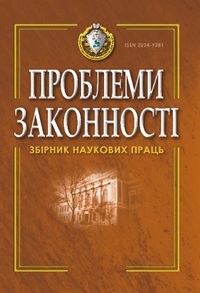Тіньова зовнішня торгівля і корупція на митницях
Hidden foreign trade and corruption on customers
Author(s): B. M. GolovkinSubject(s): Law, Constitution, Jurisprudence, Corruption - Transparency - Anti-Corruption
Published by: Національний юридичний університет імені Ярослава Мудрого
Keywords: foreign trade; shadow economy; smuggling; customs fraud; corruption; customs administrations;
Summary/Abstract: According to the Association of Chartered Certified Accountants (ACCA), the volume of the «shadow»economy in Ukraine is 1.1 trillion hryvnias or 45.1 % of the gross domestic product. Estimates of the Federation of Employers of Ukraine show that only 50 % of payments to the state budget comes from the clearance of goods, while the rest comprise a corruption component of 40 billion UAH for a year. Much of the large companies move non-declared goods across the state border and do not pay taxes. However, at the official level in Ukraine, it is still not accepted to talk about the servicing of the shadow foreign trade by the customs administration and the collection of corrupt rents from illegal trade in the state.Understanding the essence of the problem gives grounds to assert that the corruption risks in the work of customs are laid down in imperfect customs legislation, high tariff rates of duties and taxes,discrete powers of customs inspectors, the regime of customs procedures in the customs control zone, low level of their automation and physical contact of declarants from customs officers. In the customs case,the main type of corruption is bribery and abuse of influence related to the assistance of illegal and criminal activity in the foreign economic sphere. Subjects of foreign economic activity reduce costs and receive revenues through customs fraud or smuggling. Without corruption, this activity is impossible. On the illegal movement of goods and vehicles, smuggling and counterfeiting through the customs border, a criminal corruption business was created for all bodies and services that carry out various types of state control and law enforcement activities in the customs sphere.The most profitable are corruption schemes related to the illegal import / export of three groups of highly liquid products: tobacco products, counterfeit IT products, petroleum products, cars with foreign registration. For an independent study, illegal migration through the customs border of amber and wood,the manipulation of exports of grain and other highly liquid products deserve.Summarizing, we draw the following conclusions. Customs corruption is based on providing shadow foreign trade and covering economic crime on a transnational or transboundary scale. It is in violation of customs legislation by both parties in customs matters for the purpose of illegal enrichment. In corruption practices, all bodies and services that provide state control over the movement of goods through the customs border of Ukraine and carry out law-enforcement activities in this area participate. The level of corruption in the sphere of foreign economic activity depends on the volume of illegal export-import operations with raw materials and highly liquid products, as well as the ratio of official taxes and the cost of corruption services to economic entities. It was clarified that in parallel with «centralized corruption» in customs authorities there is «competitive corruption» between regional customs and their structural divisions for providing corruption services at lower prices. Measures to prevent corruption and crime should be aimed at reducing the profitability of shadow foreign trade by liberalizing the tax burden at the same time while strengthening control over transfer pricing, including the customs service into an integrated security system throughout the supply chain, implementing common customs control, managing risky operations
Journal: Проблеми законності
- Issue Year: 2017
- Issue No: 139
- Page Range: 218-230
- Page Count: 13
- Language: Ukrainian

